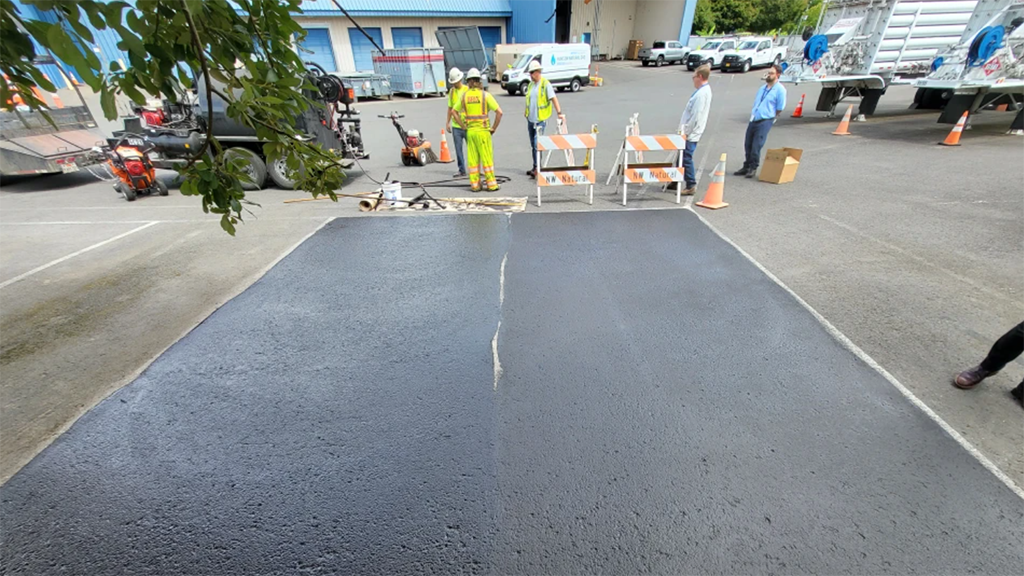Just over 12 months ago, billionaire philanthropist Bill Gates was all smiles as he visited the head office of Modern Hydrogen in Seattle, Wash., one his more successful environmental technology startups. Although looking a bit awkward wielding a shovel and wheelbarrow, Gates managed to pack a load of asphalt into a test pothole.
The asphalt mix was made from a solid material that Modern Technology captures from natural gas and permanently embeds into carbon-sequestering asphalt. They call it Modern Carbon.
“One year later, the pothole patch is holding up perfectly,” says Michael Baba, senior product development manager at Modern Hydrogen. “It’s been taking daily traffic with no issues — and frankly, it just looks like a regular part of the road. It’s dirty, it’s unremarkable, and that’s exactly what you want from good asphalt.”
As reported by the Daily Commercial News, Modern Hydrogen was created in 2015 with the help of Gates. Their proprietary technology involves a methane pyrolysis reactor that strips carbon from natural gas (methane) right at the meter or from fossil fuels or biogas from sources like manure and produces pure hydrogen fuel that releases only water vapour as a byproduct.
One key component that can be produced from this is a solid carbon that, without extra processing, can be incorporated as an ingredient in asphalt, replacing the typical bitumen used to bind the sand and gravel. This results in reduced GHGs, locked-in carbon and what Modern Hydrogen claims are up to 20 per cent in cost savings.

Asphalt is everywhere, covering 90 per cent of roads worldwide, says Modern Hydrogen. It’s one of the most emissions-intensive infrastructure materials on the planet. Much of the embodied emissions come from bitumen, the oil-based binder that holds the mix together. The company claims their Modern Carbon asphalt results in 20 per cent lower embodied emissions for the asphalt material and 11 per cent lower embodied emissions for the full lifecycle of the pavement.
Modern Carbon’s performance claims of enhanced rutting resistance, improved cracking tolerance and longer road life have been validated by the American Association of State Highway and
Transportation Officials, and the voluntary consensus technical standards under ASTM International.
Since the Bill Gates publicity shot in early 2024, Modern Carbon has moved from the lab onto the road.
In November 2024, Modern Carbon asphalt was used for the first time in the United States. The Bexar County Department of Public Works in Texas, in partnership with Clark Construction, used 100 tons of Modern Carbon asphalt for road repairs in the San Antonio area.
“We’re always, in an innovative way, looking at materials that enhance our products,” said Aaron Martinez, superintendent and supervisor of the Bexar County Public Works Judson Service Center, “and I believe carbon-sequestered asphalt is one of the ways we want to go.”
The material has now been used successfully in several U.S. states and in Alberta, Canada for local and regional projects of various types.
In Long Island, N.Y., Modern Hydrogen collaborated with National Grid, the British-based multinational utility that transmits and distributes electricity and gas in the Northeastern United States.
This showcased how emissions can be reduced by including Modern Carbon asphalt for repaving when undertaking gas line replacements.
A demonstration of smaller-scale community projects took place in Long Beach, Calif. The Family of Faith Christian Center partnered with Modern Hydrogen to apply approximately 100 tons of Modern Carbon asphalt to repair its parking lot.
And in Snohomish, Wash., 100 tons of Modern Carbon asphalt was included in a mile-long stretch of residential road, proving its use in revitalizing and decarbonizing roads facing considerable wear.
While Modern Carbon makes headlines, other proven industry efforts to reduce the carbon associated with asphalt road surfaces continue to increase. For example, the use of reclaimed asphalt for building roads grew from 15.6 per cent in 2009 to 22.2 per cent in 2022, according to the National Asphalt Pavement Association.
This is positive news and demonstrates the continued high level of environmental concern shared across the infrastructure construction industry.






Recent Comments